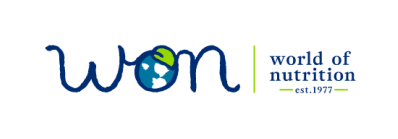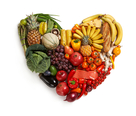 February is heart health month! This month the WON Scoop will cover several natural herbs that can help to keep your heart healthy. To feel good from your head to your feet, keep a healthy heartbeat! “It is important for Americans to recognize that, despite all of the fancy gimmicks and perceived power of modern medicine the largest explosion of preventable, chronic diseases ever in the history of mankind has occurred as a direct result of modern medicine and scientific reductionism. Modern medicine is not an antidote for the incredible harms caused by the modern food industry, but it is an effective distraction”. –Charles C. Harpe, Naturvore Power 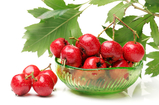 Hawthorn: The berries, leaves, and flowers of the hawthorn plant are all used for medicinal purposes. The flowers and leaves are used to normalize blood circulation, creating stronger arteries for better blood flow to the heart. Nutritionally, the berries are more beneficial for those with dysfunctional cardiac weaknesses that already exist. The berries help to support higher quality heart function. Combining the berries, flowers, and leaves is the best preventive approach for an overall healthy heart. Studies have shown that Hawthorn is excellent for both the prevention and treatment of coronary heart disease when used on a regular basis. Hawthorn is used primarily as a cardiac tonic, it is considered valuable for improvement of cardiac weakness, angina pectoris (chest pain), valve murmurs from heart valve defects, an enlarged heart, involuntary gasping or sighing, and unexplained chronic fatigue. There is evidence that it is effective for helping heart valve disorders, easing cardiac pain, regulating a rapid or feeble heart beat, difficulty in breathing, lack of oxygen in the blood, heart strain due to overexertion and is useful in cholesterol reduction. Scientists have discovered that Hawthorn increases coronary blood flow and improves myocardial metabolism, allowing the heart to function with less oxygen. Hawthorn dilates blood vessels, allowing blood to flow more freely and thus, is effective at lowering blood pressure. In addition, it acts directly on the heart muscle to help a damaged heart work more efficiently. Hawthorn can be found in our bulk section, in capsules, in blends, in our teas, and in tincture form. 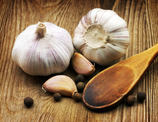 Garlic: Garlic is one of my go to herbs when cooking as I try to add it into everything. It not only tastes amazing but also smells amazing. Garlic supports the heart and blood by helping to regulate high blood pressure, high cholesterol, coronary heart disease, heart attack and hardening of the arteries. Garlic is useful for preventing atherosclerosis (hardening of the arteries), narrowing of the arteries, and reducing blood cholesterol. Your blood cholesterol level has a lot to do with your chances of getting heart disease. Garlic helps to dissolve LDL (harmful) cholesterol and to lower triglycerides (a type of fat found in your blood), while increasing HDL (beneficial) cholesterol levels. Raw garlic contains allicin, a substance that works to relax blood vessels, reduces any pressure or damage affecting blood making it an effective treatment for hypertension and high blood pressure. Garlic supplements containing allicin must be enteric coated to ensure absorption. Garlic also works at preventing high blood pressure by stimulating hydrogen sulphide and nitric oxide synthase production that relaxes blood vessels. Garlic can be found in our bulk section, in capsules, in blends and in a tincture. 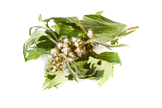 Motherwort: Motherwort is an herb that helps heart conditions aggravated by nervousness. Motherwort has the ability to improve mental outlook and reduce the effects of stress. It is good for hypertension (high blood pressure) because it relaxes blood vessels and clams nerves. Motherwort injections recently were shown to prevent the formation of blood clots, which improves blood flow and reduces the risk of heart attack, stroke, and other diseases. Motherwort also may correct heart palpitations or arrhythmias that sometimes accompany thyroid disease and hypoglycemia (low blood sugar). You can find Motherwort in our bulk section, in a blend, and in tincture form.  Ginkgo Biloba: Oh, Ginkgo Biloba! I have a lot of love for the Ginkgo Biloba tree. The history behind it and the beautiful, unique shape of its leaves are enough to intrigue anyone. Ginkgo Biloba can protect the heart and blood vessels from damage, while helping in nerve regeneration. Ginkgo Biloba is mostly used in treating vascular diseases such as peripheral vascular disease and varicose veins. It improves blood flow, by preventing restriction of blood vessels. This helps relieve pain and discomfort associated with disease. Ginkgo Biloba is a natural blood thinner and may even slightly reduce blood pressure. Ginkgo Biloba also lowers the risk of atherosclerosis, thrombosis (blood clot) and heart attack by helping remove plaque from arteries, neutralizing free radicals, preventing oxidation of LDL cholesterol and platelet aggregation. You can find Ginkgo Biloba in the bulk section, in capsules, in blends, and in tincture form. 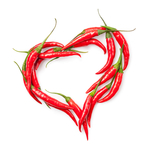 Cayenne Pepper: Many of us have used cayenne pepper to add a little spice to our meals, but did you know that it has the power to change your health? It has been used for both food and medicine for the last 9,000 years! Cayenne pepper can stimulate your body’s circulation, reverse excessive blood clotting, lower high cholesterol and prevent heart disease. Blood clots are blockages in your arteries and blood vessels that limit blood flow through your circulatory system. Cayenne encourages fibrinolysis (prevents blood clots from growing and becoming problematic). This is also the reason why cayenne pepper is effective in preventing heart attacks. The capsaicin in cayenne pepper helps to clear away artery-narrowing lipid deposits, and dilates arteries and blood vessels to clear away clots. You can find Cayenne pepper in our bulk section, in capsules, in blends, and in tincture form. 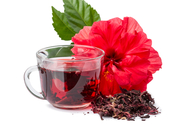 Hibiscus: Hibiscus is widely consumed around the world as a ruby-colored, lemony beverage. Recent studies show that hibiscus tea can lower blood pressure as effectively as some standard hypertension drugs. Hibiscus lowers blood pressure because it has diuretic properties. It opens the arteries, and it appears to act as a natural angiotensin-converting enzyme (ACE) inhibitor, which means it slows the release of hormones that constrict blood vessels. Because of its anti-inflammatory properties, hibiscus tea can reduce blood pressure by up to 10 points. Hibiscus tea also has impressive antioxidant properties. It lowers LDL cholesterol, helping to protect against heart disease and protecting blood vessels from damage. Dose recommendations vary from about 1-5 teaspoons of dried “flowers” per cup of boiling water. Steep five to ten minutes and drink after meals. Take readings before different doses and retest an hour later to see what works best for you. You can find Hibiscus in our bulk section and in a tea. 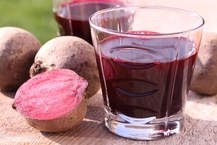 Beet Root: Although beets have the highest sugar content of all vegetables, most people can safely eat Beet Roots a few times a week, enjoying their sweet, earthy flavor. Beet Roots have powerhouse nutrients that improve heart health by lowering your blood pressure. The consumption of beetroot helps to prevent cardiovascular diseases in multiple ways, so conditions like atherosclerosis, heart attacks, and strokes are less likely to develop. Drinking beet juice may help lower blood pressure in a matter of hours. A clinical study found that drinking one glass of beet juice lowered systolic blood pressure by an average of 4-5 points. Beet Root has naturally occurring nitrates which your body converts into nitric oxide. Nitric oxide helps to relax and dilate your blood vessels, improving blood flow and lowering blood pressure. Beet fiber reduces cholesterol and triglycerides by increasing the level of HDL. The fiber in beets also works to strip excess LDL cholesterol from the walls helping to eliminate it from the body quickly. The presence of the nutrient betaine lowers the levels of homocysteine in the body, which can also be harmful to the blood vessels. You can find Beet Root in our bulk section, in capsules, and in multiple powder forms. 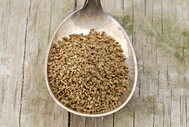 Celery Seed: Celery seeds are found in the flowers of the well-known celery plant. These small, tan to dark brown seeds have a strong but pleasant smell, and they are occasionally used in South Asian cooking recipes as a food spice. Studies show that Celery Seed acts as a vasodilator by widening blood vessels and improving circulation. It has a diuretic activity that helps reduce excess fluid in the body. When these two activities occur together they result in lower blood pressure levels. In fact, a recent study on 30 patients suffering from mild to moderate blood pressure levels showed that administering 150 mg of Celery Seed extract per day lowered both systolic (SBP) and diastolic blood pressure (DBP) levels in those patients. Therefore, for mild to moderate hypertension, using one teaspoon of organic Celery Seeds or one capsule of Celery Seed extract once daily may help protect your heart. You can find Celery Seed in our bulk section, in capsules, and in tincture form. 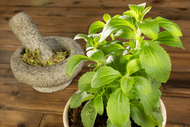 Stevia: Stevia is a small shrub like perennial plant, which belongs to the sunflower family. The leaves of Stevia are a source of natural, zero-calorie sweetener, which is considered sweeter than sugar. Stevia contains phytonutrients, trace elements, minerals, vitamins and volatile oils, which give it nutritional and medicinal properties. A number of studies show that Stevia can be beneficial in the treatment of many health conditions. It has hypertensive properties, which may help with high blood pressure. Certain glycosides in stevia extract have been found to dilate blood vessels, increase sodium excretion, and urine output. In effect at slightly higher doses than as a sweetener, stevia can potentially help lower blood pressure. The plant may have cardiotonic actions, which normalize blood pressure and regulate heartbeat. Heart health month is a great time to start replacing sugar or artificial sugars with Stevia. Stevia can be found in our bulk section, in powders and in many flavors in liquid form. 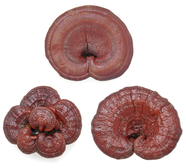 Reishi: Reishi is called the “mushroom of immortality” and the “medicine of kings.” Reishi is not often used in cooking because they are hard and have a bitter taste and you are unlikely to find them at your favorite market. They are mainly used for purely medicinal purposes and have a number of health benefits. Reishi can help treat one of America’s top killers, cardiovascular disease. The protection reishi offers against heart disease and stroke is truly remarkable. It helps prevent so many different risk factors due to its high content of heart protecting nutrients like sterols, ganoderic acids, coumarin, mannitol and polysaccharides. Experts believe that the ganoderic acids lower triglyceride levels, remove excess cholesterol from the blood, lower blood pressure, reduce platelet stickiness and even help correct arrhythmia. In fact a recent clinical study had 54 people with hypertension, who were unresponsive to medication, take reishi extract three times a day for four weeks. The study by Burton Goldberg in a book named “Heart Disease” reported this was enough to significantly lower blood pressure. Just imagine how the incidence of cardiovascular disease could be reduced if taking reishi really caught on in the Western hemisphere. You can find Reishi in our bulk section, in capsules, in a tincture and in other mushroom blends.
0 Comments
|
Brenda FarrarWON Staff Member Archives
June 2016
Categories |
